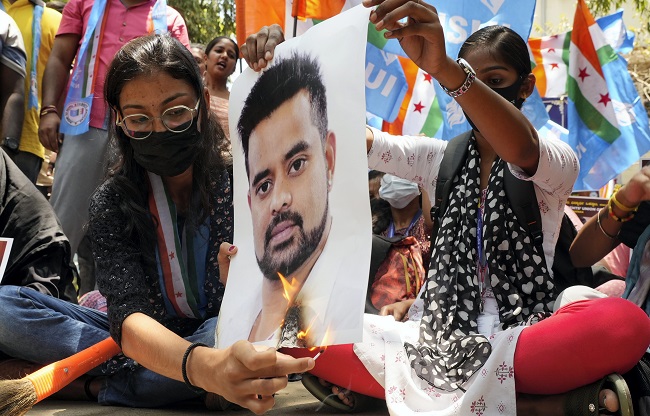Suspended from the Janata Dal (Secular) party due to his implication in a sex tape scandal, Prajwal Revanna has reportedly fled to Germany, leaving behind more than 3,000 objectionable videos that have since gone viral. His family defends that his trip was pre-planned and unrelated to the charges. This incident raises the question: why do criminals often seek refuge abroad post-crime, and does this lessen their chances of capture?
Demand for Revanna's Return
The German Embassy has abstained from commenting on the matter. However, Chief George Enzweiler mentioned he has read about the case but lacks full details. Meanwhile, opposition parties, including Congress, are demanding Revanna's extradition. Congress leader Alka Lamba urges the Karnataka Chief Minister to appeal to the External Affairs for extradition so that the fugitive can be swiftly returned.
The Allure of Foreign Escape
Fleeing abroad post-crime can be seen as a means to 'buy time.' During this period, the criminal investigates possible escape routes. Similar suspicions surfaced last year when Amritpal, a Khalistani extremist, vanished, feared to have fled the country, though later found within national borders. Moreover, several prominent economic offenders remain comfortably abroad.

Source: aajtak
How Fugitive Offenders are Captured
Extradition treaties play a pivotal role in this. Simply put, if you unintentionally take possession of someone else's property, you return it upon request. This principle forms the basis of extradition at an international level. Agreements between two countries ensure that criminals fleeing to foreign territories are repatriated. For instance, criminals fleeing from India to Britain or vice versa are to be returned and not provided asylum.
Do We Have an Agreement with Germany?
India and Germany signed an extradition treaty in 2001. Three years ago, a German national—accused of child sexual abuse—landed in India. The German government, serving as the requesting state, formally approached the Indian Ministry of External Affairs. Meanwhile, the accused was already embroiled in another case in Karnataka. Eventually, last year, the offender was extradited to Germany under the Extradition Act.

Source: aajtak
Terms of the Treaty Between the Two Countries
The foremost condition of the treaty dictates that the crime in question must be recognized as such by both nations, with a minimum of a one-year sentence. This means the crime should not be a minor misdemeanor.
When Extradition May be Denied
- If a country believes that a refugee offender is being persecuted for political reasons, denial of extradition can occur.
- Article 5 of the treaty allows a country to refuse extradition of an individual if they are a minor.
- Ambiguities in the extradition request or unclear charges can also lead to refusal.
- Article 12 requires the request to be written and sent through diplomatic channels; otherwise, no action is taken.
- Serious offenses may lead to the quick arrest of the accused under provisional custody.
- Germany has abolished capital punishment, unlike India. This could lead to refusal of extradition for death-row convicts.
- Human rights violations cited by the host country can also prevent extradition.

Source: aajtak
Offenders' Legal Challenges
Criminals may challenge extradition in court, arguing potential threats to their lives in their home country's prisons or even en route. Others may claim that the climate conditions of their homeland are incompatible with their health, delaying legal proceedings. Political changes in the country seeking extradition can also impact the timing or even possibility of extradition.
Why Countries May Provide Asylum to Offenders
Hosting an offender can be advantageous, particularly if they've embezzled substantial funds. The offenders often convince their host countries of impending investments, which may buy them temporary safety.
India's Extradition Treaties
According to the Ministry of External Affairs' official website, India has extradition treaties with 48 countries, including prominent nations such as the USA, UK, Canada, France, Germany, Australia, Saudi Arabia, and Russia. Additionally, there are extradition arrangements with 12 countries. These arrangements are less formal than treaties and may lead to silent refusal of an extradition request.




